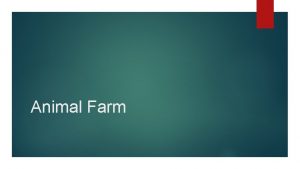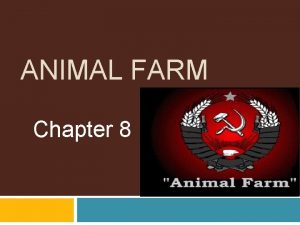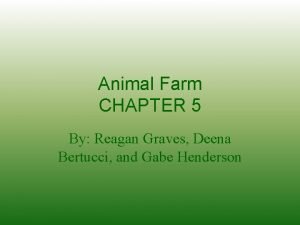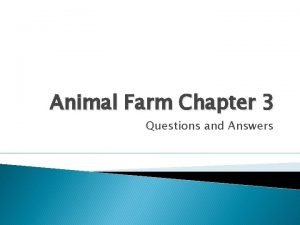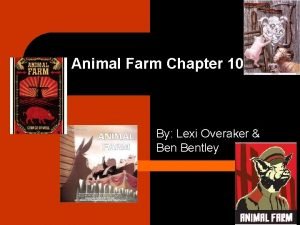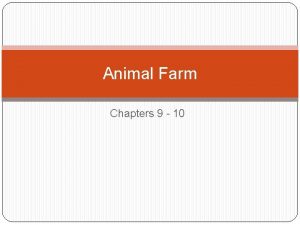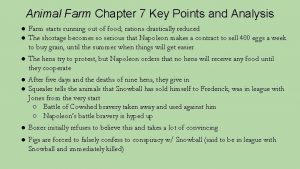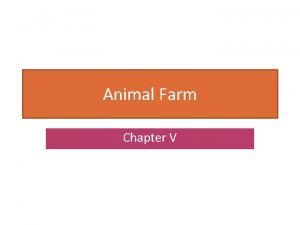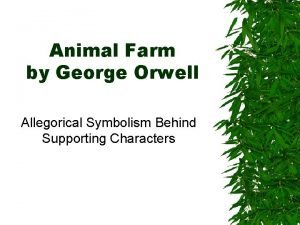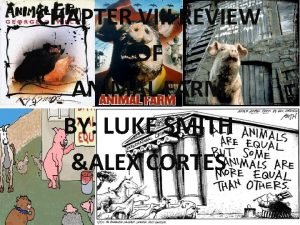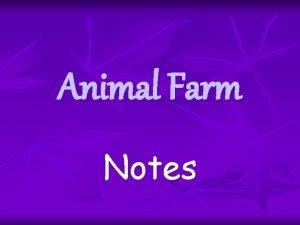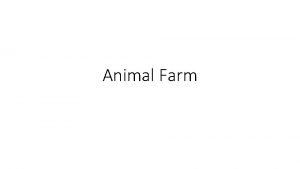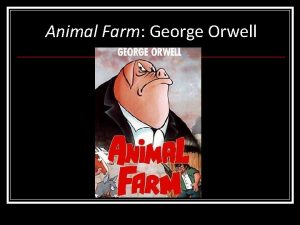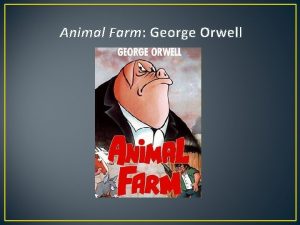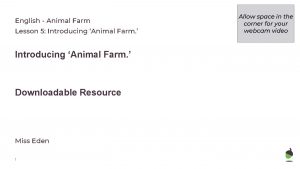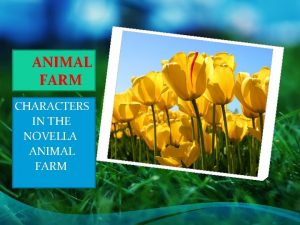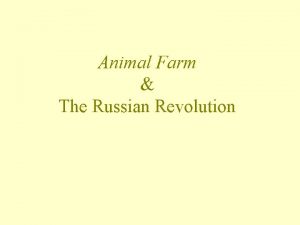Animal Farm Summary of Animal Farm Chapter 1










- Slides: 10

Animal Farm

Summary of Animal Farm Chapter 1: The speech of old Major and the invention of song; Beasts of England. Chapter 2: the major dead, the rebellion of animals; the change of farm (from manor farm becomes animal farm), the birth of commandments Chapter 3: The comrade begin to work; The birth of slogan four legs good, two legs bad; the specialty of milk and apples for the pigs Chapter 4: The attack of Jones and Faxwood; The celebration of rebellion Chapter 5: Snowball’s speech about windmill; the fight between snowball and napoleon; the attack of napoleon; the plan of building windmill by Napoleon

Chapter 6: Description of how hard the animals work; Napoleon appointed the lawyer; the pigs move to the house and sleep in on the bed (violation of 4 th commandment); the windmill is shattered the accusation to snowball Chapter 7: the production of eggs; the issues about snowball about Frederick and betrayal, the slaughter of other animals dealing with snowball’s betrayal (pigs, hens, sheep) the violation of 6 th commandment Chapter 8: The tittle of napoleon (minimus’ poem); the windmill is already built; Napoleon friend with Pilkington but sell the wood to Frederick; the banknotes were forgery; the windmill is shattered; the violation of 5 th commandment

Chapter 9: The discovery of documents snowball and Jones; the death of boxer Chapter 10: The pigs imitation of how human walk; the new slogan of “Four legs good, two legs BETTER!”, ALL ANIMALS ARE EQUAL BUT SOME ANIMALS ARE MORE EQUAL THAN OTHERS; the violation of 7 th and 3 rd commandment

What we got from animal Farm? The characteristics of communist socialist party: 1. Betrayal 2. Violate the rules 3. Manipulative 4. Exaggerate their leader 5. Harsh Penalty 6. Spread the rumor 7. Push the member to work harder and harder 8. Suppress the member’s emotional condition

Narrative Style In a third-person narrative, the narrator is someone outside the story proper who refers to all the characters in the story by name, or as “he, ” “she, ” “they. ” 1. Omniscient POV: the narrator knows everything that needs to be known about the agents, actions, and events, and has privileged access to the characters’ thoughts, feelings, and motives; also that the narrator is free to move at will in time and place, to shift from character to character, and to report (or conceal) their speech, doings, and states of consciousness.

Two types of omniscient POV: Intrusive and Unintrusive. 2. The limited point of view. The narrator tells the story in the third person, but stays inside the confines of what is perceived, thought, remembered, and felt by a single character (or at most by very few characters) within the story.

Narrative Mood : The way how the narrator tells the characters and actions. Narrative mood in Animal Farm?

It was vitally necessary to conceal this fact from the outside world. Emboldened by the collapse of the windmill, the human beings were inventing fresh lies about Animal Farm. (chapter 7, p. 41) Napoleon was well aware of the bad results that might follow if the real facts of the food situation were known, and he decided to make use of Mr. Whymper to spread a contrary impression. (Chapter 7, p. 41) Napoleon acted swiftly and ruthlessly. He ordered the hens’ rations to be stopped, and decreed that any animal giving so much as a grain of corn to a hen should be punished by death. (Chapter 7, p. 42) There was the same hearty cheering as before, and the mugs were emptied to the dregs. But as the animals outside gazed at the scene, it seemed to them that some strange thing was happening. What was it that had altered in the faces of the pigs? (chapter 10, p. 82)

Satire Convey moral instruction by means of laughter, ridicule, mockery. Today the satirist attacks individuals only at the risk of severe financial loss to himself and his publisher. In totalitarian countries he even risks imprisonment or death.
 Chapter 1 summary of animal farm
Chapter 1 summary of animal farm Animal farm summary chapter 8
Animal farm summary chapter 8 Animal farm summary chapter 5
Animal farm summary chapter 5 Chapter 3 animal farm pdf
Chapter 3 animal farm pdf Animal farm chapter 10
Animal farm chapter 10 What do the pigs green tail ribbons represent
What do the pigs green tail ribbons represent Animal farm chapter 7 and 8 summary
Animal farm chapter 7 and 8 summary What happened to mollie in chapter 5?
What happened to mollie in chapter 5? What was the problem with the farm tools in animal farm
What was the problem with the farm tools in animal farm Pinchfield farm
Pinchfield farm What purpose is served by the production figures squealer
What purpose is served by the production figures squealer
